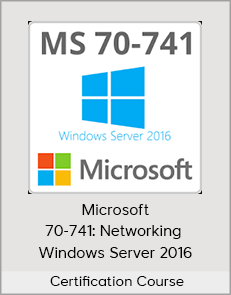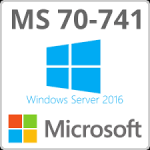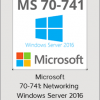Certification Course – Microsoft 70-741: Networking – Windows Server 2016
$65.00$299.00 (-78%)
Topic A: Plan and Implement IP Addressing Schemes for IPv4 Networks (1:28)
Certification Course – Microsoft 70-741: Networking – Windows Server 2016
Check it out: Certification Course – Microsoft 70-741: Networking – Windows Server 2016
Microsoft 70-741: Networking with Windows Server 2016
This course, 70-741: Networking with Windows Server 2016, covers the essential networking skills required to design, deploy, configure and support Windows Server 2016 in most organizations. It elaborates on the TCP/IP fundamentals, remote access technologies, and more advanced content including Software Defined Networking.
The course 70-741: Networking with Windows Server 2016 is part of a three course series required to pass the MCSA: Windows Server 2016 certification. The course curriculum is designed keeping in view the exam topics covered in the Microsoft exam 70-741. In this way, this course is equally helpful for IT professionals looking to gain their knowledge as well as the candidates willing to appear in the said exam.
Career Path: The 70-741 exam is geared toward network administrators that are looking to reinforce their existing skills and learn about new networking technology changes and functionality in Windows Server 2016.
Course Curriculum
-
Course Introduction (3:23)
Instructor Introduction (1:24)Chapter 01 – Plan and Implement IPv4 and IPv6 Networks
Chapter 1 Introduction (2:39)
Topic A: Plan and Implement IP Addressing Schemes for IPv4 Networks (1:28)
General Networking Requirements (4:55)
IPv4 Required Settings (3:27)
IPv4 Addresses (2:40)
IPv4 Subnet Masks (3:58)
Default Gateways (2:19)
Demo – Understanding Binary Addressing (12:29)
IPv4 Address Classes (5:20)
What are Subnets? (1:54)
The Subnetting Method (3:25)
Subnet Creation Process (3:29)
Demo – Subnetting a Network (21:34)
IPv4 Address Types (7:25)
IPv4 Network Types (2:15)
Demo – Examining VLSM (13:38)
Topic B: Configuring IPv4 Hosts (0:49)
IPv4 Configuration (2:30)
IPv4 Configuration Tools (2:42)
Demo – Configuring IPv4 (12:04)
Topic C: Managing and Troubleshooting IPv4 Connectivity (0:37)
Network Routing (3:50)
Working with Routing Tables (1:33)
Adding Static Routes (2:28)
IPv4 Troubleshooting Methodology (3:16)
Command Line Troubleshooting Tools (3:37)
Graphical Troubleshooting Tools (1:33)
Troubleshooting with Windows PowerShell (2:07)
Demo – Troubleshooting IPv4 (14:32)
Microsoft Message Analyzer (1:23)
Topic D: Implementing IPv6 for Network Hosts (1:14)
The Purpose of IPv6 (0:56)
Reasons to Use IPv6 (2:29)
Comparing IPv4 and IPv6 (2:21)
IPv6 Address Structure (3:22)
IPv6 Address Types (3:14)
IPv6 Autoconfiguration (3:49)
Configuring IPv6 (1:18)
Tools for Configuring IPv6 (1:25)
Topic E: Implementing IPv6 Transitioning and Coexistence (0:44)
Understanding Node Types (2:27)
Options for Coexistence (1:47)
IPv6 over IPv4 Tunneling (2:15)
Understanding ISATAP (2:20)
Understanding 6to4 (1:43)
Understanding Teredo (2:11)
Transitioning Process (2:23)
Chapter 01 Summary (1:56)
Chapter 01 Review (0:10)
Chapter 01 QuizChapter 02 – Installing and Configuring DHCP
Chapter 2 Introduction (1:07)
Topic A: Overview of the DHCP Server Role (0:20)
Introducing DHCP (2:08)
DHCP Components and Processes (3:06)
Lease Generation Process (3:37)
Lease Renewal Process (3:11)
DHCP Considerations (3:32)
Topic B: Deploying DHCP (0:13)
Install and Configure a DHCP Server (2:25)
DHCP Authorization (3:54)
Demo – Installing DHCP (7:23)
Creating Scopes (3:14)
Configuring DHCP Options (2:12)
Demo – Creating and Configuring Scopes (13:06)
DHCP Relay Agents (3:20)
Topic C: Managing and Troubleshooting DHCP (0:23)
Implementing Security for DHCP (5:22)
DHCP Auditing (1:27)
Demo – Configuring Security and Auditing (8:44)
DHCP Advanced Options (2:58)
Additional Scope Types (3:00)
High Availability for DHCP (4:10)
DHCP Failover (4:11)
Demo – Configuring DHCP Failover (5:21)
DHCP Database (4:27)
Migrating DHCP (1:23)
Troubleshooting DHCP (5:25)
Chapter 02 Summary (1:32)
Chapter 02 Review (0:10)
Chapter 02 QuizChapter 03 – Installing and Configuring DNS
Chapter 03 Introduction (1:53)
Topic A: Implementing DNS Servers (0:43)
Name Resolution Basics (1:55)
What is DNS? (5:09)
DNS Namespace (1:40)
Types of Names (1:24)
Internet Name Resolution (3:25)
DNS Components (3:34)
DNS Zones and Resource Records (1:56)
Installing the DNS Server (2:04)
Demo – Installing DNS (5:43)
Topic B: Creating and Configuring DNS Zones (0:32)
Resource Records (4:02)
Zone Types (4:40)
Replicating Zones (2:49)
Demo – Creating and Configuring DNS Zones (16:57)
Standard DNS Name Resolution (1:33)
Modifying DNS Name Resolution (2:15)
Working with DNS Cache (2:53)
Demo – Configuring Cache and Forwarding (6:16)
Understanding Domain Delegation (2:42)
Demo – Domain Delegation (7:11)
Topic C: Understanding Active Directory Integration (0:21)
Overview of AD DS and DNS Integration (2:16)
SRV Records (2:36)
Demo – Examining SRV Records (6:01)
Active Directory Integrated Zones (4:07)
Application Partitions (3:30)
Demo – Configuring Active Directory Integrated Zones (4:46)
Topic D: Configuring Advanced DNS Settings (0:24)
Advanced Name Resolution (5:09)
The GlobalNames Zone (2:26)
Demo – Configuring the GlobalNames Zone (5:43)
Split DNS (4:12)
Introducing DNS Policies (2:04)
DNS Policy Objects (2:20)
Demo – Configuring DNS Policies (10:38)
Implementing DNS Security (3:30)
DNS Security (DNSSEC) (1:48)
Implementing DNSSEC (2:37)
Topic E: Troubleshooting DNS Name Resolution (0:24)
Introduction to DNS Troubleshooting (1:29)
Obtaining DNS Server Statistics (0:50)
Command Line Tools (1:00)
Troubleshooting Process (1:47)
Managing DNS Services (0:48)
Testing DNS Servers (1:12)
Demo – Managing and Troubleshooting DNS (19:12)
Chapter 03 Summary (1:38)
Chapter 03 Review (0:10)
Chapter 03 QuizChapter 04 – Implementing and Managing IP Address Management
Chapter 04 Introduction (1:03)
Topic A: Overview of IPAM (0:34)
Introducing IPAM (3:04)
IPAM Benefits (1:04)
New Features in Windows Server 2016 (2:13)
IPAM Architecture (2:46)
IPAM Deployment Requirements (2:06)
IPAM Deployment Considerations (3:03)
Topic B: IPAM Deployment (0:13)
Implementing IPAM (2:23)
Demo – Installing and Provisioning the IPAM Role (23:02)
IPAM Administration (2:30)
Default IPAM Groups (1:57)
Demo – Administering IPAM (6:44)
Configuring IPAM Options (2:12)
Demo – Managing DNS and DHCP Servers using IPAM (9:44)
Topic C: Managing IP Address Spaces by using IPAM (1:11)
Managing IP Addressing (1:07)
Viewing and Managing IP Addressing (2:31)
Monitoring DHCP and DNS Servers (1:32)
Adding Address Spaces (1:01)
Finding, Allocating, and Reclaiming (1:48)
Demo – Managing IP Addressing with IPAM (6:27)
Chapter 04 Summary (1:37)
Chapter 04 Review (0:10)
Chapter 04 QuizChapter 05 – Implementing Remote Access
Chapter 05 Introduction (1:23)
Topic A: Remote Access Overview (0:15)
What is Remote Access? (3:07)
Remote Access Options (1:51)
Managing Remote Access (1:10)
Demo – Installing the Remote Access Role (3:38)
The Remote Access Management Console (1:47)
Network Policy Server (2:33)
NPS Policies (4:16)
Using a PKI for Remote Access (4:33)
Routing with Windows Server 2016 (1:33)
Network Address Translation (2:45)
Topic B: Implementing the Web Application Proxy (0:14)
Overview of Web Application Proxy (3:23)
Authentication Options (3:04)
Configuring the Web Application Proxy (1:45)
Topic C: Planning and Implementing VPNs (0:16)
Remote Access with VPNs (3:28)
VPN Connection Properties (1:38)
Tunneling Protocols (5:31)
Authentication Protocols (4:47)
VPN Reconnect (1:31)
App – triggered VPNs (2:22)
Configuring a VPN Server (1:53)
VPN Configuration Options (2:50)
Demo – Configuring a VPN Server (6:59)
Topic D: Overview of DirectAccess (0:38)
Introducing DirectAccess (2:02)
DirectAccess Components (5:20)
Deployment Options (1:53)
DirectAccess Server Prerequisites (1:25)
Tunneling Protocol Options (2:04)
DirectAccess Process Internally (1:51)
DirectAccess Process Externally (6:12)
Topic E: Implementing DirectAccess (0:15)
Simple DirectAccess Configuration (0:37)
Configuration Changes (3:48)
Limitations of Simple Configuration (2:40)
Advanced DirectAccess Options (2:12)
High Availability (3:26)
Multisite Deployments (1:35)
Configuring a PKI for DirectAccess (2:48)
Implementing Client Certificates (1:37)
Internal Network Configuration Options (3:53)
Configuring DNS Settings (2:11)
Monitoring DA Connectivity (1:41)
Chapter 05 Summary (2:09)
Chapter 05 Review (0:10)
Chapter 05 QuizChapter 06 – Installing and Configuring Branch Office Networking
Chapter 06 Introduction (1:05)
Topic A: Configuring Networking for Branch Offices (0:23)
Branch Office Scenarios (4:09)
Considerations for Branch Offices (3:17)
WAN Connectivity (3:17)
Network Services for Branch Offices (3:07)
Implementing RODCs (5:37)
Demo – Installing an RODC (8:12)
Presentation Virtualization (2:01)
Remote Desktop Services (2:12)
File Services for Branch Offices (2:44)
Print Services for Branch Offices (4:01)
Topic B: Implementing Distributed File Systems (0:36)
Introducing DFS (2:01)
DFS Components (1:11)
Types of DFS Namespaces (3:12)
Deploying DFS Namespaces (4:49)
Creating and Managing a DFS Namespace (1:23)
Demo – Creating a DFS Namespace (8:50)
DFS Replication (5:03)
DFS Scenarios (3:26)
Demo – Configuring Replication (5:38)
Optimizing DFS (5:16)
Managing the DFS Database (1:25)
Monitoring and Troubleshooting DFS (1:40)
Topic C: Implementing BranchCache (0:15)
Introducing BranchCache (1:44)
BranchCache in Windows Server 2016 (1:06)
BranchCache Modes (2:15)
Data Retrieval using BranchCache (2:29)
BranchCache Requirements (3:09)
Demo – Configuring and Enabling BranchCache (8:31)
Chapter 06 Summary (1:59)
Chapter 06 Review (0:10)
Chapter 06 QuizChapter 07 – Implementing Advanced Networking Features
Chapter 07 Introduction (1:38)
Topic A: Implementing Networking Features for High Performance (0:10)
High Performance Networking Features (0:45)
NIC Teaming (3:45)
Demo – Implementing NIC Teaming (5:54)
SMB 3.1.1 Shared Folders (2:00)
Advanced SMB 3.1.1 Functionality (5:59)
Quality of Service (QoS) (2:12)
Understanding RSS (1:16)
Understanding RSC (1:36)
Topic B: Implementing Hyper-V Advanced Networking Features (0:24)
Virtual Switch Improvements (4:36)
Extensible Virtual Switch (2:19)
Understanding SR-IOV (1:26)
Dynamic VMQ (1:50)
Advanced Features for Network Adapters (2:00)
NIC Teaming in Virtual Machines (0:42)
Topic C: Introduction to Software-Defined Networking (0:22)
SDN Concepts and Tools (3:21)
SDN Benefits (1:52)
Planning for Software-Defined Networking (1:15)
SDN Deployments (2:57)
Topic D: Overview of Network Virtualization (0:18)
Introduction to Network Virtualization (1:30)
Network Virtualization Benefits (2:44)
Generic Route Encapsulation (2:02)
Chapter 07 Summary (1:40)
Chapter 07 Review (0:10)
Chapter 07 Quiz
Course Closure (2:13)




















